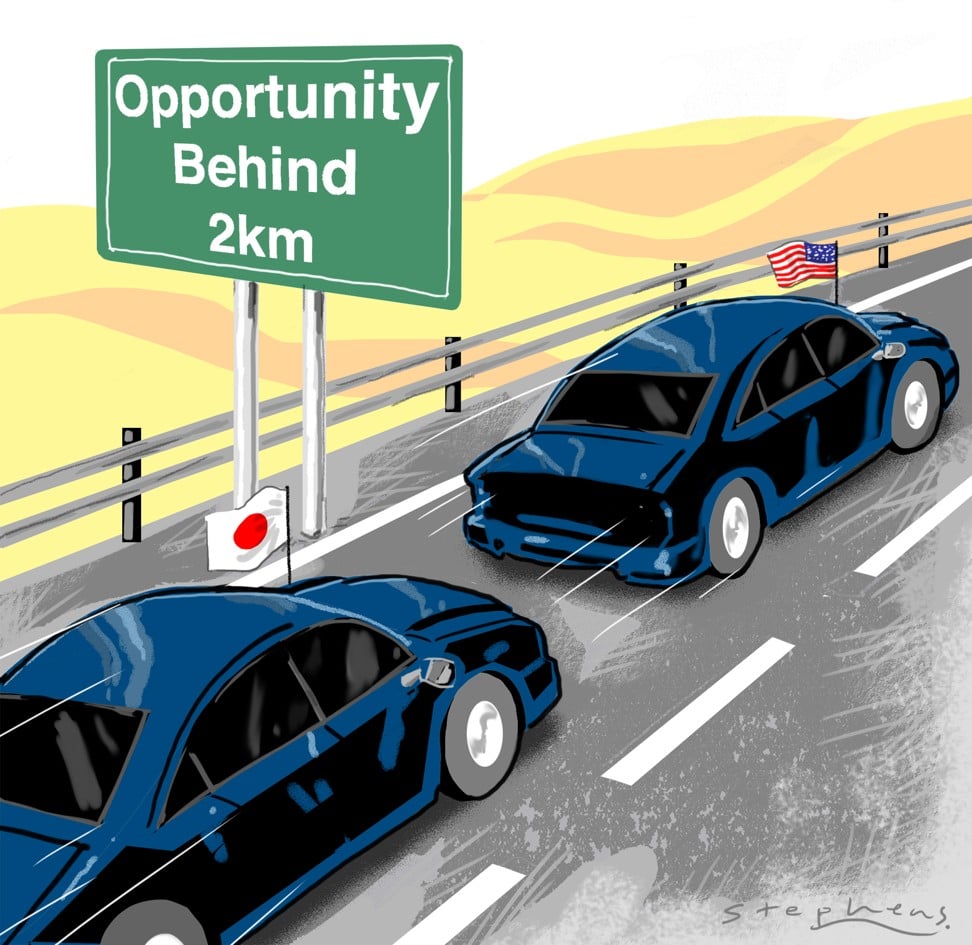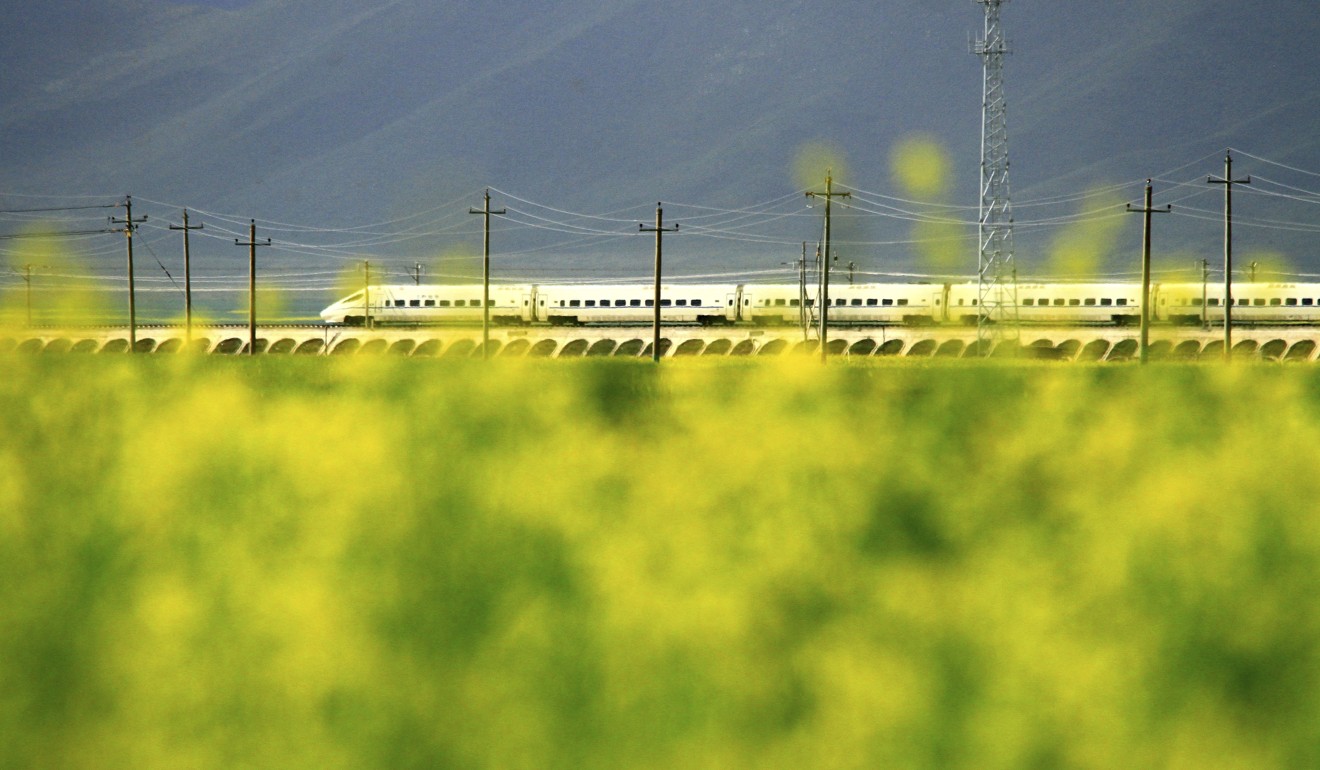
The potential benefits of the belt and road, if the dream were even only partly realised, could be enormous. Illustration: Craig Stephens
The conspicuous absence of the heads of state from the major Western economic powers and Japan at the
belt and road summit this month in Beijing is a big mistake and a missed opportunity for enhancing dynamic and cooperative globalisation.
I live in Lausanne, Switzerland, which is well known among many Chinese as the city in which the International Olympic Committee is located. My flat is near the Olympic Museum and I often walk through the Olympic Museum Park down to the lake at weekends. I did this last Saturday and there were – as there have been ever since the Beijing Olympics – busloads of Chinese tourists. More people from China seem to visit the Olympic Museum than from any other country. This would have been unfathomable when I moved there in 1997.
It is, in fact, one of many illustrations of China’s most awesome achievement over recent decades: the lifting of hundreds of millions out of poverty and the creation of a vast new urban middle class. As The Economist recently noted: “In 1981, 88 per cent of Chinese (and 96 per cent of rural Chinese) lived below the poverty line; in 2013, only 2 per cent of Chinese were extremely poor.” That is worthy of respect and admiration. If only other poor countries, notably India, could achieve something even remotely comparable.

A train runs on the Lanxin high-speed railway in Shandan county, Zhangye city, in Gansu province. The 1,776km railway linking Lanzhou, capital of Gansu, and Urumqi, capital of the Xinjiang region, is one of the major passages for China's Belt and Road Initiative. In a span of mere decades, China has lifted hundreds of millions out of poverty and created a vast new urban middle class, an achievement worthy of respect and admiration. Photo: Xinhua
China’s achievement is all the more impressive in that it was not only unprecedented, but also unexpected. The often proclaimed “era of humiliation” – from the first opium war in 1839 to Liberation in 1949 – was no myth, but very much a reality. Though China was not colonised by any single power, as, say, India was by Britain, it was what Sun Yat-sen termed a “poly-colony” – ie, gang-raped.
The West and Japan should be conscious of the scars China has from the past exploitation and thus refrain from taking the hypocritical high ground
While the rising dragon is clearly no sweet pussycat, in comparison to other industrial powers – notably Britain, France, the US, the Soviet Union and Japan – it has been pacific. Thousands and thousands of Chinese come to visit the Louvre in Paris these days, to gape at the Mona Lisa and other masterpieces of art, not to pillage and burn it down as French troops (in cahoots with the British) did to the Summer Palace in Beijing. In 1950, the newly liberated People’s Republic of China invaded Tibet, which was reprehensible, but Britain also invaded Tibet (in 1903/04), not to mention the roughly half of the planet that was conquered and subjected by the empire. In its wars against China, Japan is estimated to have caused some 30 million deaths, along with multiple mutilations, tortures and rapes. I am not aware of a single Japanese killed by Chinese troops in the course of China’s recent rise.
While the US presents itself as the great global moraliser, it seems to forget that its rise to great power status included the genocide of Native Americans, the enslavement of millions of Africans, wars against its Latin American neighbours and the conquest of the Philippines. While China went to war against Vietnam in 1979 (and lost), in terms of crimes against humanity, it was nothing compared to the war against Vietnam (and Laos) waged (and lost) by the US. Seemingly addicted to belligerence, this century has seen America’s illegal war against Iraq, with all the carnage that ensued.
All this, needless to say, is not to suggest that it is now China’s turn to invade, conquer and pillage. Though China’s 2005 pledge of a “peaceful rise” seems more illusory with each passing year, it would be in the world’s best interests if it could be achieved. Indeed, the implications of the alternatives are cataclysmic. However, in the process, the West and Japan should be conscious of the inevitable scars China bears from past exploitation and humiliation and thus refrain from taking the hypocritical high ground, which seems to be common China policy currency

People walk by workers putting up decorations this week for a board near the Xidan Cultural Square, ahead of the Belt and Road Forum for International Cooperation in Beijing. It is important that China be engaged in the institutional framework of global governance, and that initiatives for enhancing trade and investment, such as the belt and road, be welcomed rather than rebuffed. Photo: AP
It is especially important that China be engaged in the institutional framework of global governance, and that initiatives for enhancing trade and investment, such as the belt and road, be welcomed rather than rebuffed. Yet the opposite has been happening.
As Silvia Menegazzi has stated in arguing why the EU must engage with the Asian Infrastructure Investment Bank (AIIB), “the decision to launch the AIIB came as a direct result of China’s growing frustration ... over only playing a marginal role within the existing international financial system”. This is true of the International Monetary Fund and the World Bank.
As to the World Trade Organisation, the death of the Doha Round is in great part due to the inability of the erstwhile established leaders of the global trading system – the so-called “Quad”, consisting of Canada, the EU, Japan and the US – to integrate China. Instead, the US and Japan proceeded to create their own initiative, the Trans-Pacific Partnership, from which China was visibly excluded; this way, as they claimed, “we will write the rules, rather than let the Chinese do so”. Surely, the appropriate, constructive and dynamic approach would have been to write the new rules together.
Not only did the Japanese-American alliance seek to exclude China by setting up the Trans-Pacific Partnership, but when the Chinese launched the AIIB, aimed at financing much needed infrastructure investments across the Eurasian continent, they refused to join and sought to browbeat other nations to follow suit. Fortunately, on this occasion, good sense prevailed in Europe and Asia, as most countries from both joined. However, it does not make it less disappointing that the major Western powers and Japan should be no-shows at the forthcoming summit.
Of course, at this stage, the belt and road represents a vision, a dream, that will face innumerable obstacles – financial, environmental, technological, logistical, social and geopolitical – to translate into reality. It is also without doubt motivated primarily by Chinese interests. But what country ever undertook a major international initiative that wasn’t primarily motivated by its own interests?
The post-war Marshall Plan was not an act of pure American altruism, but rather one of enlightened self-interest.

A view of the Liwa desert, some 240km southeast of Abu Dhabi in the United Arab Emirates. The potential benefits of the belt and road could be enormous. The inclusion of the Middle East and Central Asia could contribute to peace and prosperity in these currently dramatically turbulent regions. Photo: Xinhua
The potential benefits of the belt and road, if the dream were even only partly realised, could be enormous. The inclusion of the Middle East and Central Asia could contribute to peace and prosperity in these currently dramatically turbulent regions.
As I have tried to stress, China is by no means an angel. Nor, however, as Western and Japanese rhetoric tends to proclaim, is it a devil; or certainly no more so than previous rising great powers. Furthermore, while for much of modern history China was subjugated and marginalised, its quite staggering re-emergence will continue to mark the first decades of the 21st century.
A successful, inclusive, globally collective effort to make the belt and road a reality could be a harbinger of peace and prosperity. It is a pity that myopia and prejudice prevent Western and Japanese leaders from being present at this potentially seminal event.
Jean-Pierre Lehmann is emeritus professor at IMD, founder of The Evian Group, and visiting professor at the University of Hong Kong
Comments: 13